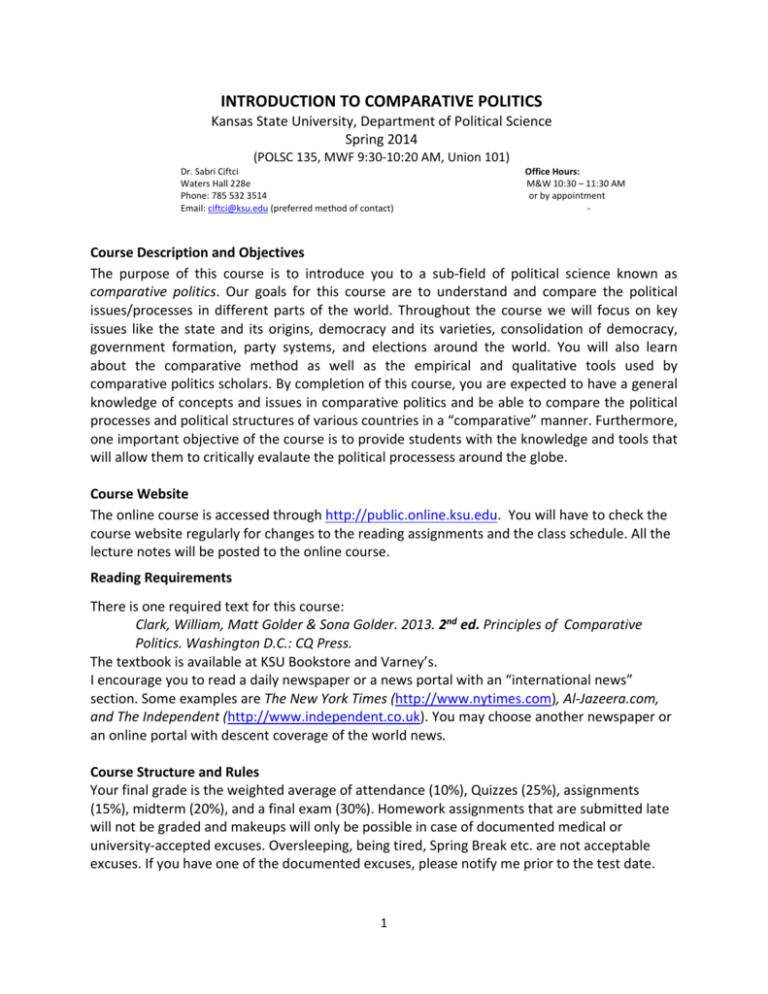INTRODUCTION TO COMPARATIVE POLITICS
advertisement

INTRODUCTION TO COMPARATIVE POLITICS Kansas State University, Department of Political Science Spring 2014 (POLSC 135, MWF 9:30‐10:20 AM, Union 101) Dr. Sabri Ciftci Office Hours: Waters Hall 228e M&W 10:30 – 11:30 AM Phone: 785 532 3514 or by appointment Email: ciftci@ksu.edu (preferred method of contact) ‐ Course Description and Objectives The purpose of this course is to introduce you to a sub‐field of political science known as comparative politics. Our goals for this course are to understand and compare the political issues/processes in different parts of the world. Throughout the course we will focus on key issues like the state and its origins, democracy and its varieties, consolidation of democracy, government formation, party systems, and elections around the world. You will also learn about the comparative method as well as the empirical and qualitative tools used by comparative politics scholars. By completion of this course, you are expected to have a general knowledge of concepts and issues in comparative politics and be able to compare the political processes and political structures of various countries in a “comparative” manner. Furthermore, one important objective of the course is to provide students with the knowledge and tools that will allow them to critically evalaute the political processess around the globe. Course Website The online course is accessed through http://public.online.ksu.edu. You will have to check the course website regularly for changes to the reading assignments and the class schedule. All the lecture notes will be posted to the online course. Reading Requirements There is one required text for this course: Clark, William, Matt Golder & Sona Golder. 2013. 2nd ed. Principles of Comparative Politics. Washington D.C.: CQ Press. The textbook is available at KSU Bookstore and Varney’s. I encourage you to read a daily newspaper or a news portal with an “international news” section. Some examples are The New York Times (http://www.nytimes.com), Al‐Jazeera.com, and The Independent (http://www.independent.co.uk). You may choose another newspaper or an online portal with descent coverage of the world news. Course Structure and Rules Your final grade is the weighted average of attendance (10%), Quizzes (25%), assignments (15%), midterm (20%), and a final exam (30%). Homework assignments that are submitted late will not be graded and makeups will only be possible in case of documented medical or university‐accepted excuses. Oversleeping, being tired, Spring Break etc. are not acceptable excuses. If you have one of the documented excuses, please notify me prior to the test date. 1 Readings, participation and attendance (10%): I will take attendance regularly in the class. You may miss at most three attendances. Medical documentation or an official letter for the university‐related activities may be accepted for any missed attendances. During the lectures you are expected to ask questions, make meaningful contributions and foster the class discussion. Your success depends on your preparation, attendance and participation. Some of the material is technical and vigorous and it will be hard for you understand it without being present in the class. If you miss class, you should get the class notes from a fellow classmate to ensure success. For participation, you should post your reaction or comments about a movie or documentary that will be shown in class. These comments should be maximum 300 words. Quizzes (25%): A total of 7 quizzes will be given in the class. I will drop the two with the lowest scores and use the top five in grade calculation. Each quiz will include multiple choice or true/false questions and it will be given in the beginning of the class. Homework Assignments (15%): Your textbook includes questions and problems at the end of each chapter. You are required to submit three assignments from these sections. The assignment list and the due dates are listed at the end of this syllabus. The homework assignments should be handed in at the beginning of the class. Midterm Exam (20%): There will be multiple choice and true‐false questions in the exam. You will be responsible from all material covered until the date of the midterm and are expected to have a good knowledge of the political systems, concepts and topics covered in the class. Final Exam (30%): The final exam will be cumulative. There will be multiple choice and true‐ false questions in the exam. You will be responsible from all material covered and are expected to have a good knowledge of the political systems, concepts and topics covered in the class. Grading Letter grades for the course will be assigned along the following scale: A: 90% or greater B: 80‐89% C: 70‐79% D: 60‐69%` F: Below 60% Academic Honesty/ Accommodations for Students with Disabilities Kansas State University has an Honor System based on personal integrity, which is presumed to be sufficient assurance in academic matters one’s work is performed honestly and without unauthorized assistance. Undergraduate and graduate students, by registration, acknowledge the jurisdiction of the Honor System. The policies and procedures of the Honor System apply to all full and part‐time students enrolled in undergraduate and graduate courses on‐campus, off‐ campus, and via distance learning. The honor system website can be reached via the following URL: www.ksu.edu/honor. “Any student with a disability that needs a classroom accommodation, access to technology or other assistance in this course should contact Disability Support Services and/or their instructor.” 2 Course Outline Week Week 1 Week 1 Date Jan 22, Wednesday Jan 24, Friday Week 2 Jan 26, Monday Week 2 Week 2 Jan 29, Wednesday Jan 31, Friday Week 3 Feb 3, Monday Week 3 Week 3 Feb 5,Wednesday Feb 7, Friday Week 4 Feb 10, Monday ***Quiz 2*** MOVIE: A Beautiful Mind, Part 2 What is Democracy and How should We Measure it? Week 4 Feb 12, Wednesday What is Democracy and How should We Measure it? Economic determinants of democracy Week 4 Week 5 Feb 14, Friday Feb 17, Monday Movie: Hotel Rwanda, Part 1 Economic determinants of democracy Week 5 Week 5 Feb 19, Wednesday Feb 21, Friday Week 6 Feb 24, Monday Economic determinants of democracy ***Quiz 3*** Movie: Hotel Rwanda‐Part 2 Cultural Determinants of Democracy Week 6 Feb 26, Wednesday Feb 28, Friday Week 6 Week 7 Week 7 Week 7 Week 8 Week 8 March 3, Monday March 5, Wednesday March 7, Friday March 10, Monday March 12, Wednesday Topic Introduction What is Comparative Politics What is Politics? Game theory as a tool Exit‐Voice‐Loyalty What is Politics? Game theory as a tool Exit‐Voice‐Loyalty Origins of the Modern State ***Quiz 1*** MOVIE: A Beautiful Mind, Part 1 Origins of the Modern State Origins of the Modern State Cultural Determinants of Democracy ***Quiz 4*** No Class, Turkish Foreign Policy Workshop in Lawrence Democratic Transitions Democratic Transitions ***MIDTERM*** Varieties of Dictatorship 3 Reading Assignment Clark et al., chapter 1, pp. 1‐8 Clark et al., chapter 3, pp. 49‐79 Clark et al., chapter 3, pp. 49‐79 Clark et al., chapter 4, pp. 87‐91 & 100‐124 No reading Clark et al., chapter 4, pp. 87‐91 & 100‐124 Clark et al., chapter 4, pp. 87‐91 & 100‐124 No Reading Clark et al., chapter 5, pp143‐160‐ Clark et al., chapter 5, pp143‐160 Clark et al., chapter 6, pp. 172‐208 No reading Clark et al., chapter 6, pp. 172‐208 Clark et al., chapter 6, pp. 172‐208 No Reading Clark et al., chapter 7, pp. 213‐248 Clark et al., chapter 7, pp. 213‐248 No Reading No Reading Clark et al., chapter 8, pp. 265‐302 Clark et al., chapter 8, pp. 265‐302 All Material Week1 – Week 7 Clark et al., chapter 10, pp. 349‐403 Week Week 8 Date March 14m Friday Week 9 March 17‐March 21 Week 10 March 24, Monday Week 10 March 26 Wednesday Week 10: March 28 Friday The Week 11 Week 11 Week 11 Week 12 Week 12 Week 12 Week 13 Week 13 Week 13 Week 14 Week 14 Week 14 Week 15 Week 15 Week 15 Week 16 March 31, Monday April 2, Wednesday April 4 Friday April 7, Monday April 9, Monday April 11, Friday Topic Varieties of Dictatorship NO CLASS, STUDENT HOLIDAY Varieties of Dictatorship Varieties of Dictatorship ***Quiz 5*** Documentary: Arab Spring Parliamentary, Presidential, and Mixed democracies Clark et al., chapter 10, pp. 349‐403 Clark et al., chapter 10, pp. 349‐403 NO READING Clark et al., chapter 12 Parliamentary, Presidential, and Mixed democracies Clark et al., chapter 12 NO CLASS, MPSA MEEETING Parliamentary, Presidential, and Mixed democracies Parliamentary, Presidential, and Mixed democracies ***Quiz 6*** Movie: A Separation, Part 1 April 14, Monday Elections and Electoral Systems April 16, Elections and Electoral Systems Wednesday April 18, Friday Movie: A Separation, Part 2 April 21, Monday Elections and Electoral Systems April 23, Institutional Veto Players Wednesday April 25, Friday ***Quiz 7*** April 28, Monday Social Cleavages and Party Systems April 30, Social Cleavages and Party Systems Wednesday May 2, Friday May 5, Monday Review May 7, Makeup Exam Day Wednesday May 9, Friday TBA TBA ***FINAL EXAM**** No Reading Clark et al., chapter 12 Clark et al., chapter 12 4 Reading Assignment Clark et al., chapter 10, pp. 349‐403 NO Reading Clark et al., chapter 13 Clark et al., chapter 13 No reading Clark et al., chapter 13 Clark et al., chapter 15 Clark et al., chapter 14 Clark et al., chapter 14 Assignments The assignment list and the due dates are listed below. Remember, you are expected to submit only three assignments from the list below. You may choose any three from the list below. The homework assignments should be handed in at the beginning of the class. Assignments could be hand‐written or typed. Hand‐written assignments should be readable. Typed assignments should be in word, 12‐points size, and free of spelling errors. Late assignments will not be accepted. Assignment Chapter 3 Problem 1 OR Problem 2 OR Problem 3 Chapter 4 Problem 1 OR Problem 4 Chapter 6 Problem 1 (Classic modernization theory) OR Problem 2 (A variant of modernization theory), OR Problem 6 (Oil and Democracy) Chapter 7 Problem 3 Chapter 10 Problem 1 Chapter 12 Problem 12 Chapter 13 Problem 3 OR Problem 4 Assignment Rule Complete only one problem Due Date January 31, in class Complete only one problem February 7, in class Complete only one problem February 21, in class Complete the problem February 28, in class March 28, in class April 11, in class April 25, in class Complete the problem Complete the problem Complete only one problem 5








